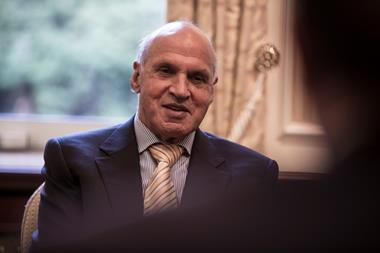The Supreme Court has ruled that the fees charged to employees to bring Employment and Employment Appeals Tribunal cases are unlawful. Could this open up c-store operators to a flood of spurious cases?
Four years ago, the government, under the orders of then lord chancellor Chris Grayling, introduced fees ranging from £390 to £1,200 for employees wanting to bring tribunal claims on dozens of grounds, from unfair dismissal to sexual orientation discrimination.
The aim was to cut the number of employees who just took pot shots at their bosses regardless of justification. The Supreme Court on 26 July, however, found the government acted unlawfully and unconstitutionally when it introduced the fees in Britain.
In its ruling, the court found the fees: interfered unjustifiably with the right to access justice under both common law and European Union law; frustrated the operation of parliamentary legislation granting employment rights; and discriminated against women and other protected groups because of the higher fees for some of the claims they brought, such as sex discrimination.
The ruling means employees can now bring claims at no financial cost to themselves, potentially exposing their bosses to a flood of claims. The evidence shows the fees certainly had an impact on the number of cases brought. Tribunal cases have dropped nearly 70% since fee-charging came into force on 29 July 2013, according to the Ministry of Justice. The Trades Union Congress (TUC) says the fall was as steep as 83% in cases that involved part-time work.
The Unison trade union, which brought the landmark court case, says the government will now have to refund more than £27m to the thousands charged for taking claims to tribunal.
Employment tips
How to avoid tribunals
Take time to select the right people rather than opting for the first one through the door
Pick employees who have customer care at the forefront of mind
Choose staff who are diligent and enjoy their jobs
Have a good HR system in place
Listen to your staff
Don’t assume you are always right
Always give any employee with a grievance a fair hearing.
Source: John Heagney, retail consultant
Some legal experts are warning of a risk that grievances that have now “run out of time” might be able to be resurrected retrospectively on the basis that employees were restricted in their ability to bring claims previously because of the level of the fees.
Kate Russell, who heads Russell HR Consulting, says in her latest consultancy newsletter: “If successful, that would open up a whole new can of worms and potentially leave respondents having to defend claims dating as far back as 2013.”
It is likely the government will now review the fee system and introduce a new one, taking into account the points raised in the judgment, she believes.
“It could choose to link fees to the value of the claim, reduce fees, or force respondents to pay fees when they file a response to a claim,” says Russell.
Ralph Patel, who owns The Look-In, in Woodmansterne, Surrey, describes the Supreme Court decision as “disappointing”, because of the reduction in the number of vexatious claims that resulted from imposing fees on employees.
The fees have been particularly helpful to smaller employers such as independent retailers, who Ralph says often have “little expertise in employment law”.
Ralph fears that a rise in claims against the convenience sector could also lead to fewer staff employed full time.
“Undoubtedly, there will be an increase in claims in the convenience sector as well as all employment sectors,” he says.
Association of Convenience Stores (ACS) chief executive James Lowman says it is right that all employees with legitimate issues should have access to the tribunals system, but he says the ACS is urging the government to monitor the situation so that all claims brought forward are robust and evidence based.
“Employees and employers in the convenience sector should first look at alternative ways to settle disputes such as [through] the government’s advisory, conciliation and arbitration service, ACAS.”
Guy Warner, managing director of Warner’s Budgens, a retailer with six stores in the Cotswolds, says he is not worried about vexatious claims. He believes that if employment procedures are “what they should be”, it shouldn’t be a problem.
“Most employees in my experience don’t want to bring claims against employers - people don’t want confrontation. It has to be an extreme case for someone to be driven to bring a tribunal claim. I’ve never met anyone who takes pleasure in having a scrap.”
Convenience veteran and consultant John Heagney believes fees have helped in stopping “some of the more spurious claims”.
But he also believes that any employee that has been wronged should be able to seek redress. “Hopefully, we will not see a return of the more spurious claims wasting the time of employers and tribunals,” he says.
A good convenience store employer should have nothing to fear, Heagney adds. “I am a believer that good employers will not face tribunals, providing that they have systems in place to ensure that they treat all employees in the way that they themselves would expect to be treated,” says Heagney, adding that good employees are businesses’ lifeblood.
He points out that in 30-plus years of being a direct employer with a team of more than 200, he has never been called to a tribunal. “I believe that this is [because] we had the processes in place to ensure that my employees were treated properly.”
Employers should treat every member of staff “properly” at all times, listen to any grievances and act “appropriately”, Heagney advises.
Danielle Ayres, employment specialist at solicitors Gorvins, warns that those employees on flexible, casual contracts who have been denied holiday pay or not been paid the National Minimum Wage will have greater access to making a claim.
Katee Dias, a senior solicitor in the employment team at City law firm Goodman Derrick, advises that for now, employers should perhaps brace themselves for an increase in the volume of claims employees bring.
“Given the inevitable period of uncertainty, employers would be wise to consider their employment practices carefully,” she says.
Source
Andrew Don




























1 Readers' comment